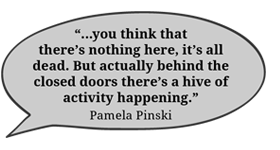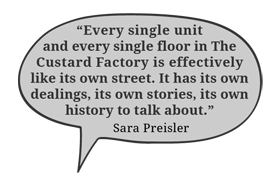 Digbeth’s industrial past has left behind numerous empty factory buildings. Yet remnants of the industrial age have been embraced and transformed, creating workspaces for creative industries in, for example, Minerva Works and The Custard Factory. John Mostyn argues that the industrial and artistic sectors exist comfortably alongside each other in Digbeth, which he feels is not found in other cities.
Digbeth’s industrial past has left behind numerous empty factory buildings. Yet remnants of the industrial age have been embraced and transformed, creating workspaces for creative industries in, for example, Minerva Works and The Custard Factory. John Mostyn argues that the industrial and artistic sectors exist comfortably alongside each other in Digbeth, which he feels is not found in other cities.
The lack of large-scale development in Digbeth has allowed for cheaper rents in the area, which has helped it to become an artistic hub. Antonio Roberts, who has organised many arts events in Digbeth, discusses how the availability of empty units provides the physical and mental space for businesses and artists to experiment. He argues that people in Digbeth are particularly open-minded and willing to support new ideas. Many organisations, such as Friction Arts, support others by providing them with a space. This has created a positive atmosphere for art to grow, and many people move to Digbeth in the anticipation that anything unexpected and exciting could happen.
 However, Alexei Berrow explains that his band has often moved practice spaces because buildings are frequently closed down and set to be demolished. Barry Boffy fears that potential development may price artists out of the area. Alexei comments, “as the money moves in, the art moves out”.
However, Alexei Berrow explains that his band has often moved practice spaces because buildings are frequently closed down and set to be demolished. Barry Boffy fears that potential development may price artists out of the area. Alexei comments, “as the money moves in, the art moves out”.
Pamela Pinski says that there are no restaurant and shop chains in Digbeth, making it different to the rest of the city. This independence is seen as an important, positive and desirable facet of the area to many of our interviewees. Barry Boffy observes that The Custard Factory in particular has acknowledged an appetite for boutique, creative and independent outlets.
Lucan Gray (Owner and Developer, The Custard Factory) says that in some ways Digbeth can be regarded as a “recession free zone” due to the nature of what people do there. Lucan argues that creative industries help economic growth. He also notes that Digbeth has gone from “creative and artistic” to “creative and digital” over the past few years. This ability to adapt to ever-changing demands and restrictions has allowed many businesses in Digbeth to survive the economic downturn. Rather than depending entirely on local trade, some businesses have taken advantage of the Internet to sell their goods worldwide.
However, spending cuts have, in some cases, placed strain on businesses in Digbeth. This has resulted in a proliferation of transient businesses, which are constantly moving in location or intentionally created as, for example, ‘pop up shops’. Emma Case and Peter Smyth of Emma Case Photography suggest that organisations in Digbeth must be mutually supportive, and they tell us that they try to spend money in the area because they want local shops to be able to remain open.
 In his interview for Digbeth Speaks, Lucan Gray explains how his father, Bennie Gray, purchased the derelict Bird’s Custard Factory building in the late 1980s. Initially it was not clear how the space should be used. During the following years, however, artists requested to use the space informally and consequently a small community became established, which included The Custard Factory Theatrical Company. Slowly it became evident that there was a great demand for locations in Digbeth where creative people could gather.
In his interview for Digbeth Speaks, Lucan Gray explains how his father, Bennie Gray, purchased the derelict Bird’s Custard Factory building in the late 1980s. Initially it was not clear how the space should be used. During the following years, however, artists requested to use the space informally and consequently a small community became established, which included The Custard Factory Theatrical Company. Slowly it became evident that there was a great demand for locations in Digbeth where creative people could gather.
Following a successful application for a ‘City Grant’, the conversion of The Custard Factory building began in the summer of 1992 and was completed by August 1993. Spaces in the building began to be occupied quickly, suggesting that it provided a much-needed place in which artists could congregate and in which creative ventures could be founded and developed.
Dave Peebles argues that The Custard Factory was perceived to be the first space in Birmingham to offer a neutral ground to bands and artists. Lucan observes that it felt revolutionary when it was first established during the 1990s but that nowadays mainstream developers are more familiar with the concept of The Custard Factory and multi-let buildings.
Many of the project’s interviewees mentioned that, in addition to more publicity for Digbeth, they would like to see further developments similar to The Custard Factory. This gives rise, however, to the contradictory issue of wanting greater numbers of people to visit Digbeth, whilst at the same time preventing the area from becoming too ‘mainstream’, a subject on which many participants commented. Lucan summarises that the essence behind what The Custard Factory is trying to achieve in Digbeth is that “it must not be generic; it’s got to be something that has some interest to it.”